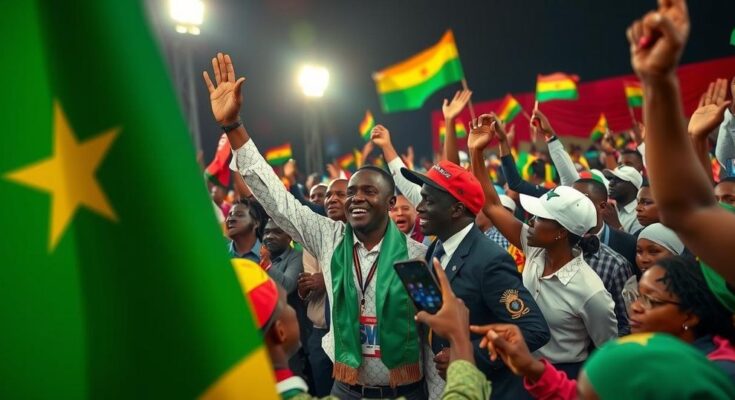Senegal’s ruling party, Pastef, has claimed a large victory in the recent legislative elections, granting President Bassirou Diomaye Faye a strong mandate for reform. Opposition leaders have conceded, and although voting was mostly peaceful, tensions remain. The government faces significant challenges despite the electoral success, particularly in addressing unemployment and public finances.
The government of Senegal has declared a significant victory in the recent parliamentary elections held on Sunday. Preliminary results indicate that the ruling party, Pastef, achieved a large majority, which is expected to empower President Bassirou Diomaye Faye to enact the economic and social reforms promised during his election in March. Opposition leaders, including former Prime Minister Amadou Ba and Dakar’s mayor Barthelemy Dias, have accepted the results despite ongoing counting. During the election, the atmosphere across Senegal remained largely peaceful, although minor altercations were reported among different party supporters prior to the polls. Government spokesman Amadou Moustapha Ndieck Sarre expressed pride in the results, thanking the populace for their support. As of now, Pastef has not disclosed the number of seats won but aims to secure 83 seats in the 165-seat National Assembly to establish a legislative majority. President Faye and Prime Minister Ousmane Sonko, leaders of the party, have faced challenges in executing their reform agenda amid a parliament dominated by opposition factions. They campaigned heavily on promises centered around radical change, aspiring to reshape Senegal’s ties with France and focus on economic reform, social justice, and anti-corruption measures which resonate strongly with the youth. Despite the favorable election results, the new government will need to navigate significant hurdles, including high unemployment rates and unstable public finances. Meanwhile, former President Macky Sall, leading an opposition faction from abroad, has accused Pastef of orchestrating “massive electoral fraud” but has not provided specific evidence to support such claims.
The recent Senegalese elections are crucial for understanding the political landscape of the country, particularly after the election of President Bassirou Diomaye Faye in March. His party, Pastef, emerged with a reformist agenda aiming to overhaul Senegal’s political and economic frameworks, particularly in relation to its colonial past with France. The sense of urgency for change is compounded by the high unemployment rates and public discontent prevalent among the country’s youth, who constitute a significant voting demographic. Furthermore, the history of opposition from previous government leaders adds a layer of complexity to the current political scenario, as the new government seeks to establish legitimacy and effectiveness in governance.
In summary, Senegal’s government has proclaimed a considerable victory following recent parliamentary elections, signaling potential advancements for President Faye’s reform agenda. While the results imply a shift towards legislative support for the ruling party, the challenges of high unemployment and economic instability loom large. Former President Macky Sall’s allegations of electoral fraud indicate ongoing political tensions, which may shape future interactions between the ruling party and opposition factions. Thus, the unfolding political dynamics in Senegal will be critical to observe in the coming months.
Original Source: www.bbc.com




